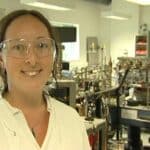Profile
Marianne Morris
-
About Me:
I am a Nuclear Physicist supporting the decommissioning of old nuclear power stations around the UK . I live in Stroud with my husband, two children and our two mad cocker spaniels, Pippa & Luna.
-
Read more
My husband and I met in 2004 at the University of Birmingham, where we both studied the same degree (Physics and Astrophysics). We got married in 2011 and now have two boys – Oscar (10) and Theo (7). Both kids are Lego and Pokemon mad!
We live in a town called Stroud which is in the Cotswolds – a really beautiful part of the SW of England, near Bristol. I love to go for long walks with our dogs. It’s very hilly around here, with the town nestled in a valley between several ridges, so there are plenty of places to get a beautiful view if you don’t mind a steep hike. Many of the views look out towards the River Severn estuary where, in the distance, you can see two of the power stations that I work for – Oldbury and Berkeley.
I absolutely love to bake and really enjoy trying out new recipes all the time. I have more recipe books than sense. I also like to keep fit and go to several exercise classes a week. I’m a reluctant runner too… Last summer I did the Inflatable 5k (google it, and then get yourself booked on) it was great fun!
I’m also currently learning Italian – it’s such a fun language to speak – and am in a women’s choir
-
My pronouns are:
She/her
-
My Work:
I am a Senior Consultant, specialising in Radiological Assessment, Radiation Shielding and Criticality Safety. It is my job to support projects at several decommissioning nuclear power stations/facilities in the safe retrievals and processing of many different types of radioactive wastes.
-
Read more
Magnox currently manages 12 nuclear sites across the country – 10 magnox power stations and 3 nuclear research sites. All of these are now being decommissioned which means they have come to the end of their operational life and must now be taken apart so that the land can be remediated for alternative use.
Nuclear energy is a highly efficient and low-carbon form of energy production but, as with all processes, there are wastes produced that need to be carefully managed, and in this case it’s due to their radioactivity. We have special ways of doing this to ensure the waste is appropriately categorised and safely processed.
In my job, I have to apply various different skills to help solve technical problems for each of the sites. I use computer codes to model/simulate radiation travelling through different materials so that I can assess how strong the radiation is at different distances from the waste. This is really important for keeping our workers safe from harm.
I also use special instruments called germanium detectors to measure the radioactivity of wastes using High Resolution Gamma Spectrometry. This is a type of particle physics where different types of atoms emit radiation at specific energies (a bit like a fingerprint) so by measuring the gamma radiation energies emitted from a waste, I can tell what type of radioactive elements are in the waste and how strongly active they are. This is important for knowing how to categorise waste, as some elements may be more dangerous than others, so that we can make the correct decisions about how to process the waste.
-
My Typical Day:
I spend most of my days working at a computer, writing reports, doing calculations, providing technical advice to the site projects to help them progress. We do a lot of our meetings now online instead of face-to-face, which makes it easier to stay in touch with people at different sites all around the country.
Occasionally I do get to work at sites on the plant, which can be great fun. Usually I will be making actual measurements with the detectors and then bring the results back to the office to analyse.
-
Read more
No two days are ever the same. I am constantly providing support to several different projects in different parts of the country. Sometimes one of the systems I look after might break down or produce an unexpected result and it’s my job to get to the bottom of the problem and make sure the sites can keep up with their processing targets. Sometimes I am involved in the design of new systems and will do lots of computer modelling and calculations to help the project figure how best to approach their problem. I might then write up my findings into a technical report.
I often use Microsoft Excel to do my calculations, but sometimes I use specialist software or write computer codes to do the complex calculations. One of the codes I use is called MCNP which I use to model waste and materials and then simulate how gamma radiation travels through the materials.
My job is mostly about problem solving which can be both enjoyable and stressful, especially when the problems are particularly tricky!
At the moment I work mostly from home – it’s great that I no longer have to commute to the office every day (both for the environment and less of my time wasted sat in traffic) but it does mean I often find myself catching up on work in the evenings as my laptop is always there. I typically start work at 9am after I get back from dropping the kids at school and finish work at 6pm. I always break up my day, if I can, by taking the dogs out for a lunchtime walk. I work part time (33 hours per week) so I have a day off on Mondays.
-
What I'd do with the prize money:
I am currently running an after school STEM club at my kid’s school. It has been very popular and I’m really enjoying the opportunity to get primary school aged kids interested in STEM. I would love to use the money to keep the club running and provide more interesting things to do. So far I have been running it out of my own pocket, which I don’t mind, but it does limit what we can do and this prize would help to build up a stock of resources to keep the club going and allow us to experiment with new things.
-
Education:
Wellsway Secondary School, Keynsham, Bristol
The University of Birmingham (4 years)
I have also completed further education modules at the University of Liverpool and the University of Manchester
-
Qualifications:
10 GCSEs – 6 x A* & 4 x A
AS-level – Physical Education (A)
A-levels – Maths (A), Physics (A), Biology (A)
MSci (Hons) Physics and Astrophysics (2:1)
MSc Radiometrics: Instrumentation & Modelling – Principles of Radiation Detection, High Resolution Gamma Spectrometry & Applied Statistics
MSc Nuclear Science & Technology (NTEC) N13 – Criticality Safety Management module
-
Work History:
2003-4 – Greggs bakery, Sales Assistant
2006-7 – Silver Service waitress at country hotel
2008 – Wessex Water, Energy Accounts Administrator
2008-9 – Wessex Water, Quality Management Systems Administrator
2009-11 – Magnox Ltd, Graduate Scheme
2011-2014 – Magnox Ltd, Specialist Engineer (working on electricity generating power stations)
-
Current Job:
2015-present – Magnox Ltd, Senior Consultant (working on decommissioning power stations)
-
Employer:
Nuclear Restoration Services (NRS)
(formerly Magnox Ltd)
-
My Interview
-
How would you describe yourself in 3 words?
Trying my best :)
What did you want to be after you left school?
I never had a fixed plan, I've always just taken the next step. Growing up I did loads of dance lessons.... would have loved to have been able to dance for a living!
Were you ever in trouble at school?
Very rarely - I was far more likely to be in trouble at home instead
If you weren't doing this job, what would you choose instead?
I'd love to run a little tea rooms where I can bake and serve cakes!
Who is your favourite singer or band?
My favourite bands are Muse, Foo Fighters and The Carpenters
What's your favourite food?
Pizza
If you had 3 wishes for yourself what would they be? - be honest!
More time with my kids, more sleep, more chocolate (that I don't have to share with the kids)
Tell us a joke.
Which fast food is the most radioactive? ........ Fission chips!
-






